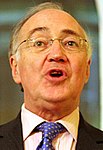Conservative Party (UK) leadership election, 1997
|
|
|||||||||||||||||||||||||||||||||||||||||||||||||||||
|
|||||||||||||||||||||||||||||||||||||||||||||||||||||
|
|||||||||||||||||||||||||||||||||||||||||||||||||||||
|
|||||||||||||||||||||||||||||||||||||||||||||||||||||
A leadership election was triggered in the British Conservative Party when John Major resigned on 2 May 1997, following his party's defeat at the 1997 general election (which ended 18 years of Conservative government of the UK). Major had been Conservative leader and Prime Minister since 1990.
The following candidates announced their intention to stand:
In the months before the general election a number of other prominent Conservatives were talked about as potential leaders; however, several failed to hold their seats in the general election including the following:
In addition, many had speculated about Chris Patten returning to Westminster (he had lost his seat in the 1992 election) and becoming leader; however, the contest took place before Patten's term of office as Governor of Hong Kong ended.
Howard had been regarded as a serious contender but had been damaged by the criticisms of Ann Widdecombe (who had served under him at the Home Office) that he had "something of the night about him" and by the decision of William Hague, who had originally agreed to support Howard and become Deputy Leader, to stand in his own right.
Peter Lilley withdrew. He and Howard gave their backing to William Hague.
For the final round, Redwood gave his backing to Clarke, an unusual development in that Redwood (eurosceptic) and Clarke (europhile) held opposite views on the main issue of dispute amongst Conservatives. In return for the endorsement, it was generally understood that Clarke would name Redwood Shadow Chancellor. This pact backfired, however, and the agreement was seen as so cynical that it drew comparison to the Nazi-Soviet Pact of the late 1930s. It prompted former Conservative Prime Minister Baroness Thatcher to publicly endorse Hague. In the event, most of Redwood's supporters switched to Hague rather than to Clarke.
...
Wikipedia





